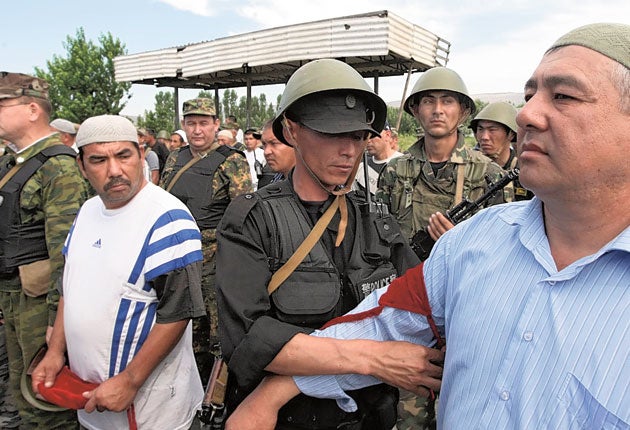Kyrgyz leader says 2,000 may have died in clashes

A million people have been affected by the recent violence in Kyrgyzstan, United Nations officials said yesterday, as the country's interim leader admitted that more than 2,000 people may have died in the clashes.
Clashes between ethnic Uzbeks and Kyrgyz in the south of the troubled Central Asian state began last weekend, and the situation in and around the city of Osh is still tense.
Amid criticism that her government was no longer in control, Roza Otunbayeva – who has headed the provisional government formed after the president Kurmanbek Bakiyev was ousted in April – paid her first visit to the scarred streets. "We have to give hope that we shall restore the city, return all the refugees and create all the conditions for that," she said after flying in by helicopter.
Whole neighbourhoods of Osh have been reduced to rubble, and in some areas ethnic Uzbeks are still hiding behind barricades to protect themselves from the Kyrgyz gangs that have been marauding through the streets, targeting Uzbeks and their homes. Human Rights Watch said yesterday that it had documented several cases in which ethnic Uzbeks were assaulted by men in camouflage when trying to enter a hospital or pick up humanitarian aid.
Three cargo planes carrying 80 tonnes of humanitarian assistance from the UN are due to arrive in Osh this weekend. But international organisations yesterday emphasised the scale of the devastation, and called on the UN to authorise a peacekeeping mission to the region.
"With a death toll likely to reach far higher than the official count of 200 and an estimated 400,000 displaced in Kyrgyzstan and across the border in Uzbekistan, the situation poses a significant threat to international peace and security," said a letter to the UN Security Council, jointly signed by the heads of Human Rights Watch and the International Crisis Group. "The Security Council has an obligation to respond to these risks and should act immediately to work with the government, regional organisations and others to prevent further escalation of violence, including by authorising international law enforcement and security assistance," the letter concluded.
Azimbek Beknazarov, deputy head of the provisional government, said yesterday that 223 people had died in the riots, but most people believe the actual death toll is much higher, given that the official total only counts those registered dead at hospitals. Many are believed to have been killed in their homes, and in the streets, and buried quickly according to Islamic traditions.
"I would increase by 10 times the official data on the number of people killed," the country's interim leader said yesterday.
Ms Otunbayeva has asked Moscow to send the Russian army to Kyrgyzstan to help quell the unrest, but her requests have gone unheeded. However, yesterday she said that Russian forces would help guard "strategic installations" in the country. Whether those would extend beyond the battalion already sent to reinforce security at the Russia air base in northern Kyrgyzstan was unclear.
Dmitry Medvedev, the Russian President, yesterday warned that if order was not restored soon, Kyrgyzstan risks falling under the control of Islamic extremists. "When people lose faith in the ability of the civil authorities to bring law and order and decide there is only one force that can do it, then we can end up with a Kyrgyzstan that would develop along the Afghan scenario, the Afghan scenario of the Taliban period," he said.
Meanwhile, the US Assistant Secretary of State Robert Blake visited refugee camps in neighbouring Uzbekistan and described the situation as a humanitarian crisis. He called on the Kyrgyz authorities to hold a formal inquiry into what had caused the riots. "We ... believe there should be an investigation," he told refugees at the Uzbek camps. "We are working with the government of Kyrgyzstan to provide security so you can return home safely."
Kyrgyzstan's interim government has suggested that the ousted president, Mr Bakiyev, and his son Maxim were behind the unrest, paying volunteers to make attacks on both ethnic Uzbeks and Kyrgyz in Osh, and set off a spiralling chain of ruthless revenge attacks. Mr Bakiyev, who has taken refuge in Belarus, has denied being behind the violence.
Maxim Bakiyev gets asylum
Kim Sengupta
*The son of the deposed Kyrgyz president has been granted temporary asylum in Britain. Maxim Bakiyev, whose father, Kurmanbek Bakiyev, was overthrown two months ago, has claimed that he would face a political trial and persecution if he was returned to his country. Officials in Kyrgyzstan have accused Bakiyev junior of stoking the recent violence in Osh and being involved in embezzling part of a £200m loan from Russia.
They said he would "either be extradited or judged" in the UK, as there is an Interpol warrant for his arrest. Mr Bakiyev, who flew in to Farnborough Airport in Hampshire on a private jet, said in a statement issued through his solicitors, Carter-Ruck: "I have been forced into exile in fear for my life. The interim government in Kyrgyzstan accuses me of new crimes every day. The charges are bogus, to divert attention from their own crimes.
They accuse me before there has been any opportunity for an investigation. Clearly they seek to try to make me a scapegoat for the chaos in the country. I view events in my homeland with horror and pray for an end to the violence."
Subscribe to Independent Premium to bookmark this article
Want to bookmark your favourite articles and stories to read or reference later? Start your Independent Premium subscription today.

Join our commenting forum
Join thought-provoking conversations, follow other Independent readers and see their replies